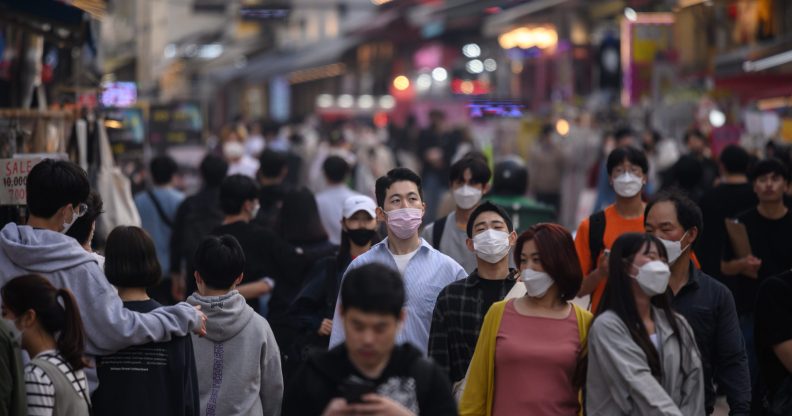Second wave of coronavirus in South Korea linked to queer bars and LGBT+ spaces in Seoul

South Korea announced its highest number of new coronavirus cases for more than a month on May 11, driven by an infection cluster in a Seoul nightlife district just as the country loosens restrictions. (ED JONES/AFP via Getty)
Fears of a second wave of coronavirus in South Korea have been sparked by a cluster of new cases in the country’s capital, Seoul, many of which have been linked to queer bars.
The country’s response to COVID-19 has been praised and in recent weeks it had hugely reduced the number of new infections.
South Korea had just begun to ease some social distancing measures, according to Reuters, but on Sunday night officials reported 35 new infections, the highest number in more than a month.
Of the new cases, 29 have been linked to nightclubs and bars in the Itaewon neighbourhood of Seoul, many of which were LGBT+ spaces, leading to reports of a potential second wave of coronavirus.
South Korea officials have, as of Monday, been desperate to track down anyone who recently attended the bars and clubs and have them tested, but homophobia in the Asian country has stalled their progress.
South Korea fears second wave of coronavirus.
Prime minister Chung Sye-kyun said on Monday: “Our top priority is to minimise the spread of the infections in the greater Seoul area. We should quickly find and test them, and speed is key.”
In tackling coronavirus, the country has used intense tracing methods and has publicly disclosed details of those who were infected to encourage testing.
But LGBT+ people in South Korea still live in fear of discrimination, and so are avoiding being tracked by authorities for fear of being outed.
Officials have tested more than 2,450 people who attended the clubs and bars, but are still searching for 3,000 people who may be infected.
Yoon Tae-ho, of the country’s health ministry, acknowledged the LGBT+ community’s fears at a press briefing, and added: “We release the movement of confirmed patients to encourage anyone who might be exposed get tested voluntarily.
“We urge you to refrain from distributing patients’ personal information or groundless rumours, which not only hurts them but can also be subject to punishment.”
The Korean Centers for Disease Control and Prevention (KCDC) said that 86 people had tested positive so far in connection with the outbreak, but KCDC director Jeong Eun-kyeong said it was too early to call the new coronavirus cases in South Korea a second wave.
She added: “The epidemic is ongoing.”
It is not just in South Korea that anti-LGBT+ sentiment is hindering the fight against coronavirus.
Like in South Korea, health authorities in Japan have begun contact tracing coronavirus patients to learn how they were infected and to stop the spread of the virus.
Many LGBT+ people fear they could be outed against their will if they fall ill with the virus as the current policy allows governors to arrange questioning of patients and to authorise an investigation of their contacts and the places they’ve visited.

